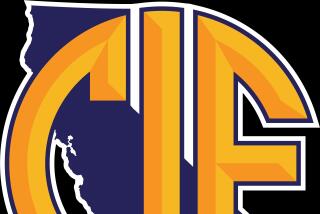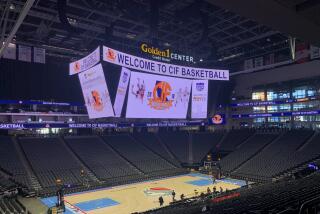Beating the Press
If the National Assn. of Basketball Coaches has its way, college coaches, club coaches and camp organizers will play a substantially reduced role in the summertime recruiting of high school and junior college basketball players.
The NABC Board of Directors has proposed restricting the summer recruiting season to a series of USA Basketball Development camps, state high school sanctioned all-star games and national junior college-sanctioned all-star events.
College coaches would be banned from contacting high school players on the telephone until Aug. 15 before their senior year with the exception of one call in April or May. They also would be restricted from speaking on the phone with high school, AAU or summer coaches from July 1 through Aug. 14.
The proposals are designed to reduce the time spent by college coaches recruiting during the summer. They also would lessen the influence of club coaches and camp organizers, some of whom use the lure of exposure to college recruiters as a way to attract top players to their teams and events.
“It’s become tougher [on high school coaches] because the AAU teams are basically controlling the kids and their way of thinking,” Dorsey High Coach Kevin Gibson said.
At the same time, the NABC is proposing to increase the number of evaluation days permitted during the fall and spring. Currently, there are 23 days available in July for coaches to evaluate prospective athletes and 40 days between Nov. 17 and March 15.
“There are concerns about the number of events being conducted during the summer,” said Jim Haney, executive director for the NABC. “The summer is becoming increasingly more important and detracts from the high school season. The goal was to increase the opportunities for high school and junior college coaches to take a more prominent position in the recruiting process.”
The proposal is expected to be considered by the NCAA Management Council at its two-day meeting in Kansas City, Mo., beginning Monday. From there, it probably will be passed on to the NCAA subcommittee on recruiting, which will meet in December.
If, as expected, the plan gains momentum, it will then take legislative form. Changes in the college recruiting calendar probably won’t take effect until 1999 at the earliest, Shane Lyons, an NCAA Senior Membership Service representative, said.
Sonny Vaccaro, a representative of Adidas who runs the prestigious ABCD summer camp in New Jersey, strongly criticized the proposal. In particular, Vaccaro objects to making USA Basketball the only organization sanctioned to run summer camps that can be attended by college coaches.
“Who deemed the wisdom of Solomon on these people?” Vaccaro said. “If they make summer a dead period for all organizations, Sonny Vaccaro will lead the parade down Broadway. But who said the people who run USA Basketball are moral?”
USA Basketball has formed a committee to develop the concepts for running eight regional camps under the proposal, Haney said.
The proposal could have a significant financial impact on such tournament organizers as the Chatsworth-based Pump brothers, Dana and David, who sponsor more than a dozen camps and all-star competitions during the summer.
“All I do is provide venues for kids to gain exposure,” David Pump said. “This is my source of income. This is what I do for a living.”
Nike spokesman Vizhier Mooney said Nike would continue to support its prestigious All-American camp held in the summer even if coaches were barred from attending. She said Nike endorses changes in the summer recruiting period.
“Clearly, what’s happening is the current recruiting environment breeds a frenzy during the summer,” Mooney said.
Bobby Braswell, Cal State Northridge’s basketball coach, is in favor of shortening the summer recruiting period. “It’s just too long,” he said. “By the second or third weeks, we’re just out there because everyone else is out there.”
Steve Miller, basketball co-coach at North Hollywood High, said any proposal giving back authority to high school coaches and taking pressure off players during the summer would be a positive step.
“I like the idea of kids working in the summer trying to get better rather than trying to sell their bodies to the best bidding all-star coach,” Miller said.
Gibson agrees.
“The AAU teams have basically taken over most of the power that the high schools have,” Gibson said. “The kids coming back don’t understand that it’s education along with athletics, as opposed to just athletics. By putting control back in the high schools, they are starting to build the student-athlete again as opposed to just the athlete.”
Already, the NABC may be backing down from a proposal to change its early letter-of-intent signing period from November to late December or January. Some coaches have complained that a later signing date would help high-profile schools.
Whichever new recruiting rules are adopted, Haney said the proposals have been “a catalyst for discussion.”
“The consensus is there needs to be a change,” he said.
More to Read
Go beyond the scoreboard
Get the latest on L.A.'s teams in the daily Sports Report newsletter.
You may occasionally receive promotional content from the Los Angeles Times.











